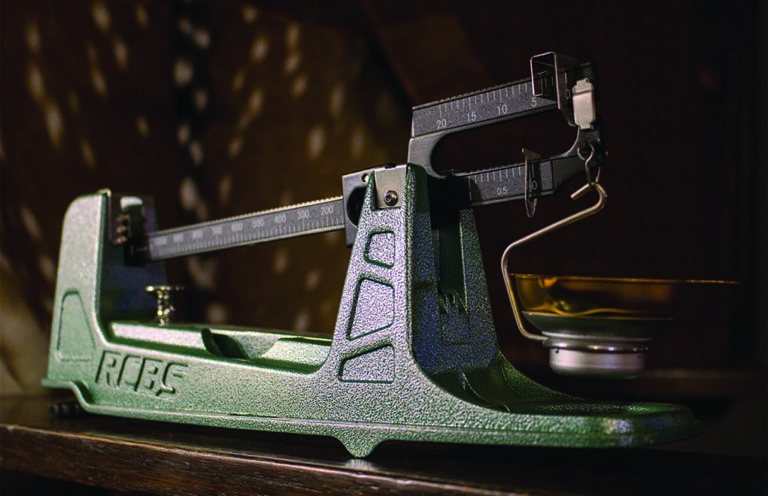
Be there a more important tool on a reloading bench than a reloading scale?
One of the handiest pieces of gear any reloader should own is a good scale.
Weighing the various components of your handload is one of the most essential activities; it’s used for much more than just weighing a powder charge—as you’ll see.
The types of scales used by reloaders generally break down into two categories: the balance beam scales, fueled by gravity, and the electronic pressure scales, which use a piezo unit to measure pressure and convert that into weight. Both scale types can have issues, and both are excellent in their own way. I personally recommend owning both as a means of checking things once in a while.
The Balance Beam Scale
The balance beam scale is one of mankind’s oldest means of weighing an object, and it remains a perfectly viable means of accomplishing all your reloading tasks. While some consider the balance beam to be antiquated, I can assure you that when you want the absolute truth, you should reach for a properly setup balance beam scale. After all, gravity doesn’t wear out. Models with good magnetic damping will speed up your measurements, because the scale will take less time to settle.
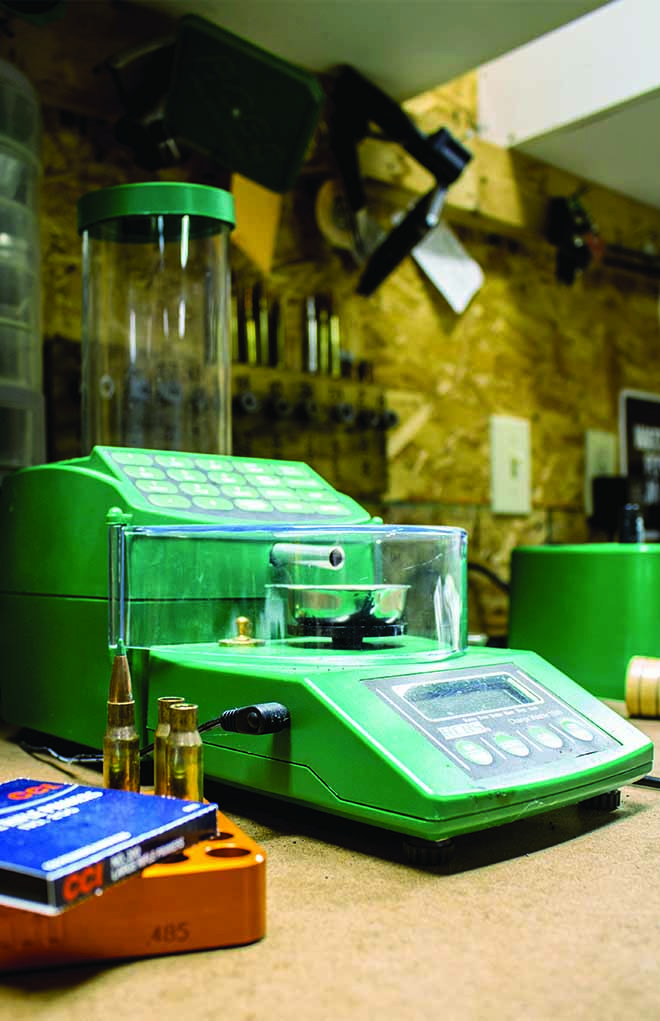
I’ve used a good number of balance beam scales over the years; my dad’s RCBS 505 scale served as the only means of measuring in our minimalist setup, and it served us well.
I like the Redding Model No. 2 Powder & Bullet Scale because, as is the case with most things Redding makes, it’s probably over-designed. Stainless steel bearing seats hold the ground knife edges of the beam for a lifetime of service. The scale is accurate to a tenth of a grain, and the plate at the pointer end of the beam is graduated in one-tenth-grain increments—quickly indicating an accurate measurement above or below your target weight.
The Redding Model No. 2 has a 505-grain capacity, which is perfect for most applications (such as weighing cases, powder and bullets). If I had to find a fault with the No. 2, it would be the small disk at the bottom of the pan hook assembly: It’s flat, and I’ve had the pan slide off more than once. The location of the zero-adjustment screw can be a problem for guys with large hands, but for those who appreciate tools that’ll most definitely last a lifetime, the No. 2 might be exactly what you’re after.
For bigger jobs, the RCBS M1000 is a good scale. It offers increased capacity, measuring up to 1,000 grains. With a unique split-beam design, the M1000 is good for weighing fully loaded cartridges—in order to guarantee each one has a powder charge—or for weighing truly heavy projectiles. It’s a solid choice for an all-around reloading scale, although it will take up a bit more room on your bench.
There are other choices, but among the balance beam scales I’ve used, these three represent the best value out there.
Load Up On Reloading Info:
- The Flexible And Forgiving .30-06 Springfield
- The .45 Colt: A Wheelgun Classic
- .300 Win. Mag.: The Answer To Most Hunting Questions
- Tips For Reloading the .223 Remington
Electronic Scales
When the electronic scale first came on the market, they lost my trust immediately. I couldn’t get the early units to maintain zero, and the readings I was getting simply weren’t consistent.
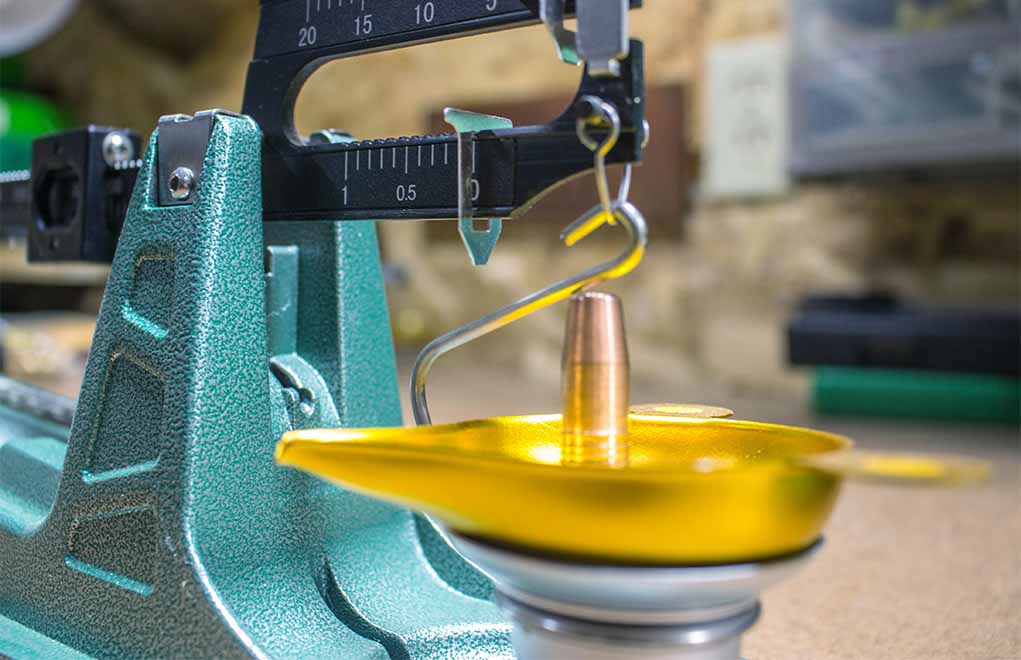
Thankfully, that’s all changed. Modern electronic scales (or maybe they’re more properly called “pressure monitors”) are fantastic tools that are fully capable of accurate, consistent measurements. I remember that when the RCBS ChargeMaster 1500 powder dispenser first came out, I was amazed at how quickly and efficiently it would throw its powder charge … but I was absolutely certain the weight of that charge was inconsistent and/or incorrect. How wrong I was!
I set out on a mission to get the unit to “vomit” by throwing a false charge or to simply deliver consistent loads that would measure differently than one of my trusted balance beam scales. I have two of the RCBS units and, over the course of tens of thousands of cartridges, I can’t find any fault with either of them.
I’ve heard reports of interference from fluorescent lights, although I haven’t experienced that personally, and I’ve heard that the units need at least 30 minutes to warm up before giving accurate measurements. I do know that moving air will drastically affect the measurements, so be careful with open windows, fans and other sources of a breeze.
My two RCBS ChargeMaster units sit on a sturdy bench (there are virtually no vibrations in my shop), and I level the machines. I’ve had nothing but good results. I can say the same for the ChargeMaster Lite. If the instructions are followed, they work as advertised, delivering precise charges of powder quickly and efficiently.
RCBS’s new MatchMaster powder dispenser uses what’s called a “pharmaceutical-grade scale” for its high-tech operation. It measures—accurately, mind you—down to 0.04 grain; this is something most scales can’t, or won’t, claim. I’ve toyed with the MatchMaster at the SHOT Show, and I’m eager to spend more time with it.
There are many good electronic scales on the market—and not just from RCBS, but from Lyman (I love the Pro-Touch 1500) and Frankford Arsenal, for example. However, my point is that they’ve become utterly reliable.
The Uses
Measuring our powder charge is the first and foremost use of a good scale, but to improve on the consistency of our handloaded ammunition, we can also weigh and segregate the cases and projectiles.
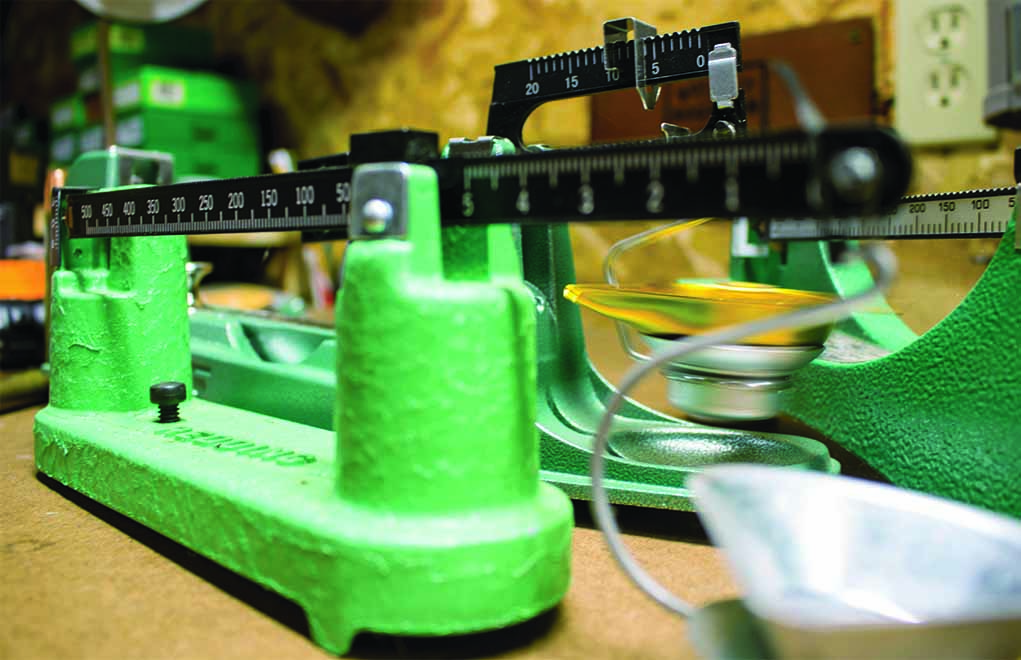
You’ll find yourself using the scale more often as your reloading skills advance, so you should invest in the best you can afford. I enjoy owning both the electronic and balance beam varieties, and I use both types during each in-depth reloading session. Do some additional research to find the type (or types) that will work best for you, and help make the most of your reloading time.
The article originally appeared in the April 2020 issue of Gun Digest the Magazine.
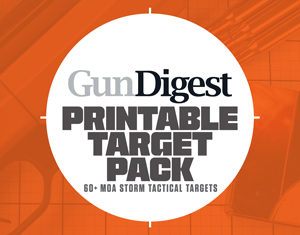
Next Step: Get your FREE Printable Target Pack
Enhance your shooting precision with our 62 MOA Targets, perfect for rifles and handguns. Crafted in collaboration with Storm Tactical for accuracy and versatility.
Subscribe to the Gun Digest email newsletter and get your downloadable target pack sent straight to your inbox. Stay updated with the latest firearms info in the industry.

![Best Concealed Carry Guns In 2025 [Field Tested] Wilson Combat EDC X9S 1](https://gundigest.com/wp-content/uploads/Wilson-Combat-EDC-X9S-1-324x160.jpg)


![Best 9mm Carbine: Affordable PCCs [Tested] Ruger Carbine Shooting](https://gundigest.com/wp-content/uploads/Ruger-Carbine-Shooting-100x70.jpg)
![Best AR-15: Top Options Available Today [Field Tested] Harrington and Richardson PSA XM177E2 feature](https://gundigest.com/wp-content/uploads/Harrington-and-Richardson-PSA-XM177E2-feature-100x70.jpg)
